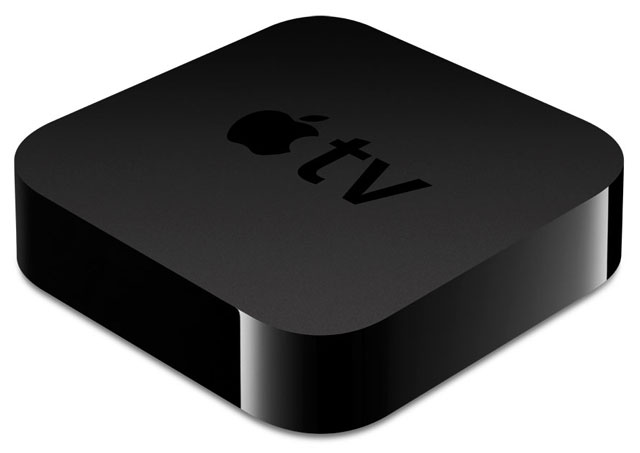
It’s not much to look at — sleek, black and about the size of two decks of cards — but this little box may represent the greatest threat the television industry has faced. A large part of this threat is explained by the logo embossed discreetly on the top of the box — a stylised apple missing a single bite.
It’s called the Apple TV, but should not be confused with the fabled television set that Apple has long been rumoured to be working on. This little device essentially hijacks your TV and turns it into an Internet-powered entertainment screen, able to stream content directly from Apple’s own iTunes store as well as online services such as Netflix, Hulu and YouTube.
That might seem like a non-starter for bandwidth-starved South Africans, but the Apple TV can also stream videos directly from any device running iTunes (including iPads). Both devices simply need to be connected to the same Wi-Fi network and, bingo, you’re watching your entire digital video collection on your TV.
So, why should the television industry be worried? Reason one: Apple is making a lot of money selling its devices while television makers are (mostly) losing money. IHS iSuppli, an industry analyst, reported that only two of the top five television manufacturers in the world made a profit last year. That implies tens of millions of high-end TV sets were sold at a loss.
One of the reasons for this slump is that younger people are simply not buying as many television sets as in the past. A key differentiator between millennials — the generation of people born roughly between 1980 and 2000 — and older generations is that they watch almost no live television. They watch popular TV shows, yes, but they tend to rent or download them.
This trend presents a huge problem to free-to-air broadcasters that rely on advertising to cover most of their costs. They can still make some money from online rentals but, like the music industry, they realise this will put the likes of Apple and Netflix at the centre of the industry and shove them to the fringes.

Premium television channels, with their dutiful subscriber bases, are better insulated from this trend. But as the remainder of millennials reach working age (in 2018 or 2019), they are more likely to engage in “cord cutting” — eschewing monthly subscriptions in favour of the all-you-can-eat buffet available online.
Another reason for the TV industry to be worried: none of the players understands the first thing about software or interfaces. Using the Apple TV is as intuitive and pleasurable as picking up an iPad for the first time. It’s quick, easy and, above all, beautiful. Compared with the menu systems on most TVs and DVD players, Apple is like something out of a sci-fi movie.
But it’s more than just an interface problem. While most competitors have been distracted by the enormous success of its phone and tablet business, Apple has quitely been building a vast content acquisition and delivery network. Add that to the hundreds of millions of people around the world who trust Apple with their credit cards, and you have a company that could soon challenge the likes of Disney for dominance in the entertainment industry.
But Apple isn’t the only giant company stealthily invading this market. Amazon, best known for peddling cheap books on the Internet, has its own global content network and its own huge database of credit card-wielding customers. Its Amazon Instant Video service is already available on hundreds of devices from set-top boxes and game consoles to Internet-enabled TVs.
The next logical step for Amazon is a set-top box of its own to rival the Apple TV, and indeed it is already working on one. The launch date is still somewhat vague, but it’s likely to be before the end of this year. A few years ago, we might have questioned whether Amazon should be getting into the device market, but the success of its Kindle line has proven it has the know-how to compete in the space.
What about the woebegone television manufacturers? After a wave of much needed consolidation, the best companies such as Samsung and LG will survive. But they will need to push back against the tide by learning the hard lessons about software and interface design.
Samsung has made a great success of its smartphone business by adopting Google’s Android operating system. It is now trying to do the same thing with Google TV — a piece of video streaming and management software that aims to be the Android of televisions. That said, when a search-engine company is starting to move into your market, it’s time to get worried.
So will any of this matter to South Africa? Will there be a wave of satellite dish smashing as youngsters abandon DStv in favour of Apple or Amazon, or even Google? Until broadband prices come down, the answer will be no, but it’s quite likely that prices will halve again within a few years.
A decent uncapped broadband connection at home costs between R700/month and R1 000/month. Were that to fall below R500, it would become very competitive with MultiChoice’s premier bouquet, which costs about R650/month. Netflix offers an all-you-can-eat package for just US$8/month that substantially duplicates DStv’s entertainment offering, without the annoyance of having to wait until something is screened to watch or record it.
The trump card for MultiChoice will be its unparalleled sports content. Few sports-mad locals will be willing to cut any cords or smash any dishes if it means they lose access to their beloved SuperSport. But that trump card will only hold for so long. Like everyone else in the television industry, MultiChoice will eventually need to have an answer to the Apple and Amazon juggernauts inexorably rolling on to its turf. — (c) 2013 Mail & Guardian
- Alistair Fairweather is the GM for digital operations at the Mail & Guardian
- Visit the Mail & Guardian Online, the smart news source

